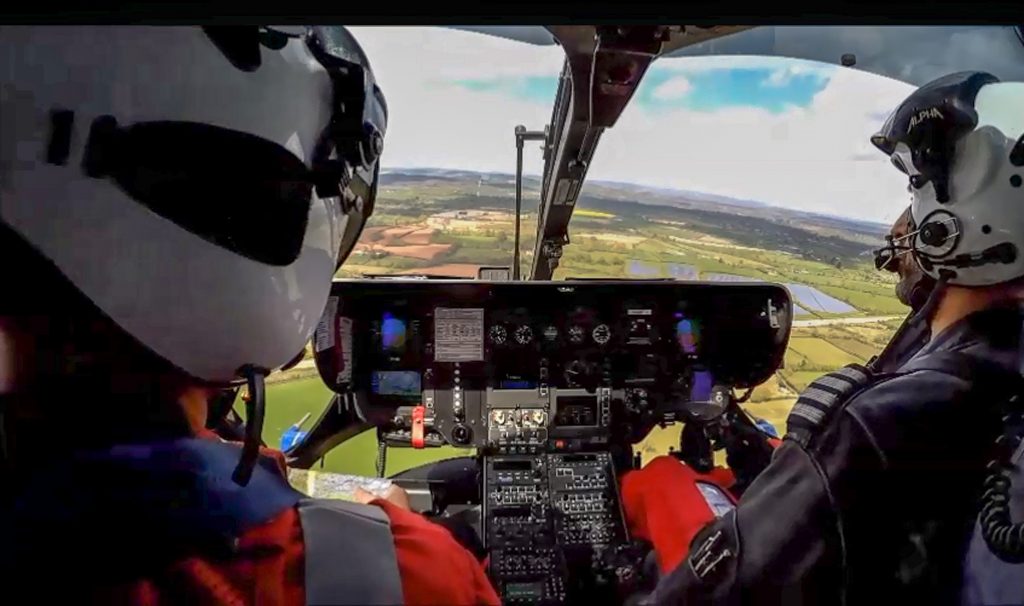
Monthly talk: Trevor Huggons – Devon Air Ambulance
Our guest speaker in February was Trevor Huggons from Devon Air Ambulance. This organisation is a very visible and welcome presence across Devon as we see their distinctive red helicopters in our skies.
Trevor told us a little about the history of the organisation but focused much more on its work today and the many changes made to the way it works since its creation. It first came into service 1992, largely as a result of the vision and hard work of Anne Thomas. Her son, Ceri, was tragically killed in 1986 when knocked off his bike. He was taken to hospital but his life could not be saved. Anne asked the medical team what might have been done which could have saved his life, and was told that getting him to hospital sooner might have helped. This spurred her to work to create an air ambulance service for Devon.
 In recent years, there have been some significant changes in how the service operates, some of which may appear to be rather technical but are actually of real significance to us all. In 2014 the Devon Air Ambulance became an independent air operator (ie it became an ‘airline’), a change which alone saves over £12k per month. In 2019, the service was registered as a health care provider, meaning that it had access to patients’ health details. Amongst other benefits, this means that the team can be in contact with patients after they have been given emergency care; staff can speak to them later, explain what had happened to them when often they have no memory of what had taken place. While most of us would regard their work as centred on helicopters, this is far from the case. There are now two critical care cars which work alongside the helicopters, and are equipped identically to the helicopters.
In recent years, there have been some significant changes in how the service operates, some of which may appear to be rather technical but are actually of real significance to us all. In 2014 the Devon Air Ambulance became an independent air operator (ie it became an ‘airline’), a change which alone saves over £12k per month. In 2019, the service was registered as a health care provider, meaning that it had access to patients’ health details. Amongst other benefits, this means that the team can be in contact with patients after they have been given emergency care; staff can speak to them later, explain what had happened to them when often they have no memory of what had taken place. While most of us would regard their work as centred on helicopters, this is far from the case. There are now two critical care cars which work alongside the helicopters, and are equipped identically to the helicopters.
While the original vision was to get sick and injured people to hospitals faster than by conventional emergency services, this is not now the prime purpose. Today, the teams of paramedics employed by the Air Ambulance are trained and equipped to provide ‘hospital level care’ in situ. This is above the level of care provided by the paramedics in ambulances. Devon Air Ambulance personnel are able to carry out procedures such as open heart surgery, sedation, administer powerful drugs such as fentanyl, and to provide hospital level support to other medics before they are transported to hospital.
The two helicopters are based at Exeter Airport and Roborough in north Devon. Between these two, virtually all of the county can be reached within 10-15 minutes. There are about 200 locations across Devon which are surveyed and deemed suitable as landing places for the helicopters, and the ambition is to have a landing place in every community in the county. As technology has improved, flights can also be made at night, and there is now a service 19 hours per day.
The sheer volume and range of missions conducted each year is remarkable, and is increasing every year. In 2024, there were 1254 missions by helicopter, and 1102 by car. 334 calls were to road traffic incidents. 1187 calls were to respond to medical emergencies, while 1252 were as a result of trauma. Medical cases are invariably taken to Plymouth’s Derriford Hospital and trauma cases to the RD&E in Exeter.
All of the air ambulance services across the country receive no government funding. The Devon Air Ambulance is proud that it is ‘Funded by the People of Devon’. This independence means that the service is able to determine its own pathway and is not subject to changes in government policy. Obviously, this means that there has to be a major fund raising operation.
It is no surprise that to maintain two helicopters, emergency support cars, to employ and train high quality staff and provide them with the equipment required, is extremely costly. The Devon Air Ambulance annual budget is £11.5 million. 23% of this is provided by donations, and fundraising accounts for 17%. The lottery provides a significant 23% of the total. The most important contribution of all is the 35% which comes from legacies but, of course, it is very hard for planning to be made on this basis given the uncertainty over when legacies will be forthcoming! If you want to know more about how you can enjoy the lottery, follow this link https://www.daat.org/support-us/charity-lottery/
When you hear the helicopter and recognise it as the small red one operated by the Devon Air Ambulance, you will now understand more about what they are doing for all of us across the county, but if you want to take this further, you might like to visit their website on https://www.daat.org/
John Vick
Photos credit: Devon Air Ambulance
